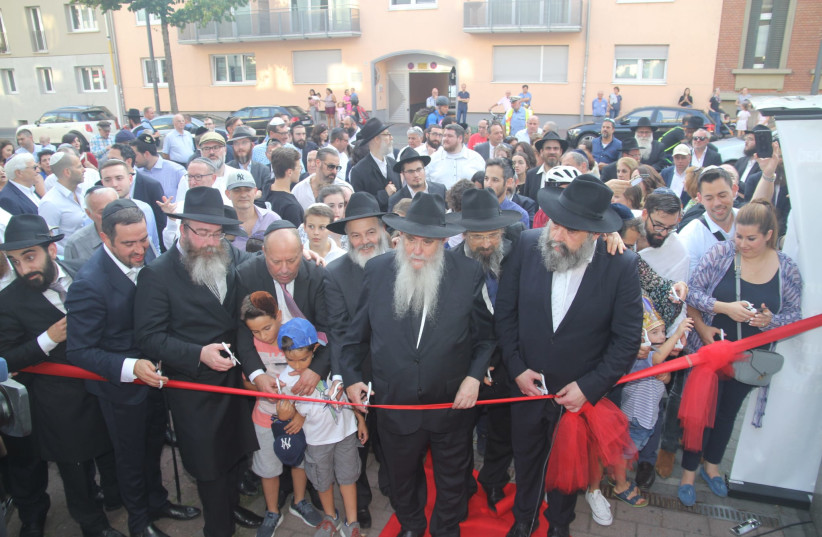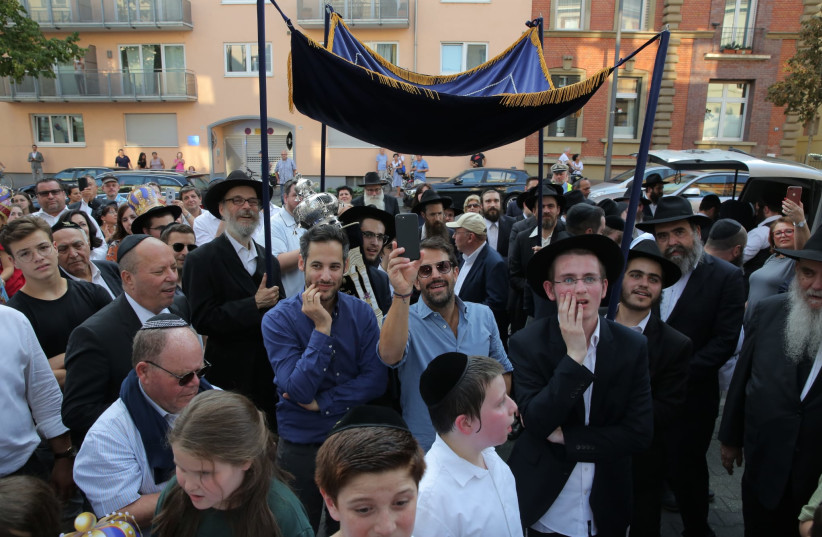Discrimination or bureaucracy? A Jewish community in Germany struggles – exclusive
An Orthodox Jewish community in Germany claims that the local Hesse government is “deliberately making it difficult for us,” and according to them, will not fund any of its activities as it does for other religious communities.
A source within the Chabad Jewish community in Frankfurt, which claims to have 1,250 families registered, spoke with The Jerusalem Post this week and claimed that since the establishment of this community in 2019, despite their efforts to receive state funding from the Hesse government, they haven’t received an answer for their requests.
A source in the community told the Post that “after several years in which the state refuses to dedicate a budget for our community, in accordance with German law,” they have decided to officially “embark on a legal battle and claim that intentional harassment prevents them from the possibility of financing security for the Jewish community building.”
The source explained that the need for security in synagogues and community centers is important, since “a number of attacks that targeted Jewish communities had taken place in Germany in recent years, but were stopped because of a protected door the terrorist came across.”
Some of the congregants are Ukrainian refugees
According to the community, the Hesse government is also withholding aid from the Jewish community, some of which are refugees from Ukraine who arrived in Germany with barely any belongings.
 Ceremony at the Chabad community in Frankfurt, Germany. (credit: RAFAEL HERLICH/COURTESY)
Ceremony at the Chabad community in Frankfurt, Germany. (credit: RAFAEL HERLICH/COURTESY)Frankfurt is the fifth largest city in Germany and is considered an important international financial center. The Jewish community there is one of the oldest in Europe and one of the few that continued in succession from the Middle Ages.
The Chabad community was established in 2019, after many years of its rabbi, Zalman Gurevitz, wasn’t on good terms with the older, more established Jewish community, The Jewish community in Frankfurt (Jüdische Gemeinde Frankfurt am Main), established in 1949. It is one of the largest unified Jewish communities in Germany. This community considers itself inclusive of “diverse forms of Jewish life,” including liberal and Reform Jewish services, as well as orthodox. As of 2019, the congregation boasted 6,316 members.
JTA reported in 2017 that the Frankfurt Jewish community has distanced itself from the city’s Chabad-Lubavitch chapter following a series of alleged instances of “disrespect” shown against local non-Chabad rabbis.
In an open letter, the Jewish Community of Frankfurt am Main group wrote that the city’s synagogues will no longer provide rooms for Chabad events. The letter cited “increasingly aggressive behavior” and “insults” from Chabad rabbis aimed at two local rabbis, Avichai Apel and Julian Chaim-Soussan.
“Jewish and religious life in Frankfurt was possible before Chabad and we are ensuring that it will continue to be possible without the involvement of Chabad,” the Frankfurt group said in its letter in 2017.
Gurevitz, a Chabad emissary who grew up in France, established a new community, called Orthodox community of Frankfurt (Jüdische Gemeinde Chabad). He invested in bringing more emissaries, founded a yeshiva, and began offering services to the Jewish community members. In 2007, Gurevitz became known internationally, after being stabbed by a Muslim terrorist when he returned from the synagogue to his home.
 Ceremony at the Chabad community in Frankfurt, Germany. (credit: REFAEL EHRLICH)
Ceremony at the Chabad community in Frankfurt, Germany. (credit: REFAEL EHRLICH)In accordance with the German Law on Religions and Churches, Dr. Bernd Schlueter, a lawyer hired by the Jewish community four years ago, submitted a request for assistance to the Hessisches Kultusministerium (Education Ministry of the State of Hesse) in accordance with the principles enshrined in the Basic Law of the Federal Republic of Germany.
The Chabad community sent a letter to Hesse Education Minister Alexander Lorz on May 30th, via Schlueter, in which they said that “Chabad Frankfurt submitted a detailed application for participation in the services to promote Jewish life in Hesse. The right to equal participation in such state benefits has been fully recognized by case law and in a large number of state treaties.”
“We have not received a decision on our application to date,” Schlueter stated in the letter. “After years of waiting for a decision on the application, our clients understandably have no more patience,” Schlueter wrote, explaining that they have no choice but to publicize the matter in the international Jewish media. In addition, they said they would file a lawsuit against the government for discriminating against them.
“We very much regret that this will cause damage to the reputation of the state government and to the Jewish community,” the letter by Schlueter suggested. In addition, the community claims that there may be other reasons for not agreeing to acknowledge Chabad as a religious community in Frankfurt, such as political motives, which aren’t clear to the Post.
According to a source in the Chabad Jewish community, the Hesse government has asked to check every single one of the 1,250 members of the community in order to make sure that they indeed are active members. “No other religious group or community center is known to be examined in such a meticulous manner,” the source said. According to this source, the examination by the state was positive and all of the details were recognized.
The Chabad community shared a recent document from the Hesse government in which it is stated that the request for recognition of this Jewish community is “still under consideration,” even though it is growing and hosts an active synagogue and a diverse set of community activities.
An additional source in the community said to the Post: “It is a shame and a disgrace that in today’s Germany there are still those who subject such a large community to outrageous discrimination, and mistreat us under a bureaucratic cover story.
“There is no doubt that if we had been a Christian or Muslim religious community, the long-awaited approval would have come a long time ago,” the source in the Chabad community said. “We have no doubt that this harassment does not represent the majority of the citizens of the state and most of the officials of the state of Hesse,” he concluded.
The Post asked the Hesse Education Ministry to comment on these allegations on June 25, but hasn’t received a response.
JTA contributed to this report.




Comments are closed.